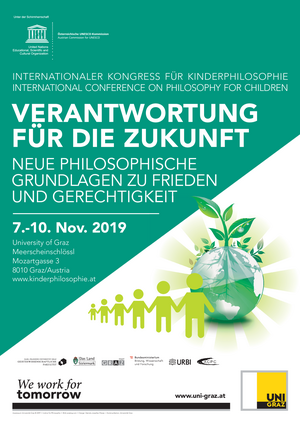International Conference of Philosophy for Children 2019
"Responsibility for the Future - New Philosophical Foundations for Peace and Justice"
7-10 November 2019, in Graz/Austria
"Humanity is in a crisis - and there is no other way out of this crisis than solidarity between people." Zygmunt Baumann
The topicality of the subject is undisputed in view of the global political situation. We are confronted with horror stories in the media on a daily basis, yet everything seems to go on as normal in everyday life.
Is it completely normal for shocking events to turn into the boring routine of normality? Are only children particularly susceptible to dealing with human rights issues, climate change, peace and justice? What does philosophy give us to take a nuanced stance on current events when we are usually at a loss for words?
We are all aware that we are facing major challenges because we are dealing with rapid developments as a result of the well-known processes of climate change, globalisation, digitalisation and artificial intelligence. This affects the different forms of society and state and, in particular, the different societies. For example, climate change is a global problem that could significantly and irreversibly change life on the planet. The consequences of climate change and the unequal distribution of damage make it clear that the future debate on global justice will play an important role. The causes of climate injustice in the world are repeatedly emphasised: Economic growth without limits, inequality between rich and poor, armed conflicts, racism, insecurity and the effects of climate change on the world's poor in particular. In the future, climate change will not only affect ecosystems but also the stability and peace of states and societies to an ever greater extent. Is climate change becoming a threat to peace?

Raising awareness of peace and justice is therefore becoming more relevant than ever. This also applies to the rapidly changing relationships between the individual and society, particularly because increasing digitalisation, artificial intelligence (AI) and robotics are bringing about changes that affect both state, non-state and individual dimensions.
and individual dimensions. The race for the technologies of the future has begun - the development towards Society 4.0 - the complete networking of man and machine. Are we surrendering our self-image as free subjects to the most concise form of machine intelligence, the algorithm? Will self-learning systems plan more rationally than fallible humans in the future? What enormous opportunities and what major risks does this development harbour? How do we want to deal with the possibilities of artificial intelligence in our society? Who bears the responsibility? The aim of the congress is to gradually work out the connections between cognition, perception and reality in all their complexity and dynamics in order to enable better understanding and to develop arguments for peace and justice that are as qualitative and quantitative as possible. While governments around the world are negotiating the future of our planet, one important interest group is often missing - children and young people. However, the responsibility to deal with the problems that arise falls back on the adolescents in the various countries, as they are the ones who will ultimately have to implement and achieve the agreements and goals reached at a global level in the future. For this reason, and in the interests of intergenerational justice, it is necessary to meet in a more open and differentiated way ("dialogue between the generations"), as it is becoming increasingly clear that awareness and reflection call for current priority processes and movements ("Fridays for Futur", "Me too") to be given greater recognition, especially with regard to children. This year's congress is once again planned as an inter/transcultural forum in order to facilitate philosophical discussions on current phenomena and to build bridges to other scientific disciplines. An important aim of this event is to initiate an exchange of different approaches and thus make further knowledge bases explicit for both educational concepts and educational policy initiatives.
educational policy initiatives.
The topics of the congress will focus on the following areas:
- Relations between reality and virtuality
- Problems of nationalisms
- Power and language
- News and fake news
- Community of Inquiry (research community)
- Pluralistic democracy and human rights
- Freedom and self-determination
- Justice in a globalised world
- Philosophy and digitalisation
- Responsibility for the environment and living beings
- Philosophy and scientific and technological progress
- Connections between communication and life forms
- Philosophical perspectives and educational processes